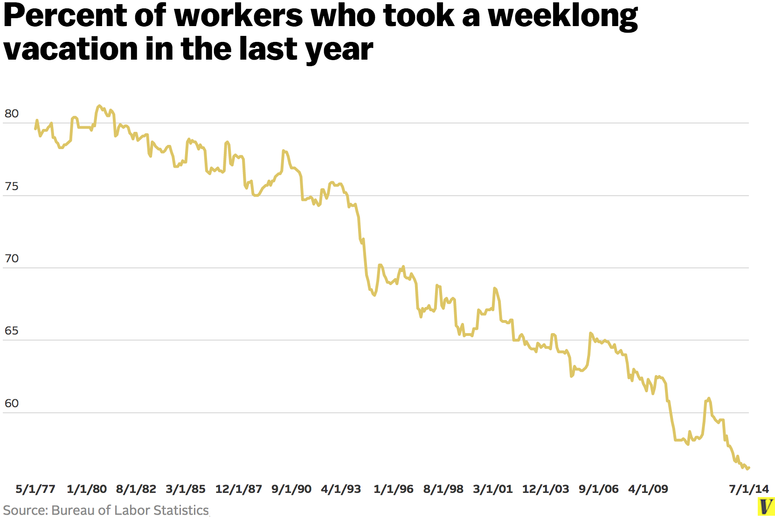Today's chart is perfectly timed for me, as starting from tomorrow I am heading out for a few days off. But my (too short) vacation I have lined up also aligns with an overall downward trend in the duration of American worker's vacations, as seen in the chart below, (courtesy of Vox). As always, some FREE commentary after the chart.

From the data, which was sourced from the Bureau of Labor Statistics, about 9 million Americans took a full week of vacation in July 1976. Contrast that to July 2014, when just about 7 million Americans scored a full week of sun or sand or just sleeping in on the sofa. If that does not seem like a big drop over about 40 years, consider that there are about 60 million more people employed in 2014 than there were in 1976. Bottom line, this data suggests that American workers, on the whole, are not taking long (used loosely) vacations like we used to.
What might that mean for us today? Here are three quick takes, and I would love to hear what you think as well.
1. The paradox of constant connectivity - Smartphones, tablets, Wifi in every coffee shop, bar, restaurant, etc. should (theoretically) make it easier for workers to go on longer vacations, but for some reason that is not happening. There are pretty few places in the country/world one can run off to on vacation and not be at least somewhat reachable. So in theory the ability to be reached, to monitor work and chech emails for any dire emergencies, and actually even do some work while on vacation has never been easier. But that still isn't allowing American workers to disconnect from work as much as we used to. Why not?
2. FOMO - Fear of Missing Out - This phenomenon, described as a form of social anxiety, fed by smartphones and social networking, is one where we become compulsively concerned that we might miss an opportunity for social interaction, a novel experience, or other satisfying event. If you are not constantly checking your friends' Facebook and Foursquare updates, you might miss something really cool happening across town, for example. FOMO is a prety-well documented psychological dependence in social interactions, but since we use the same tools and tech more and more for work, then it makes sense that a kind of FOMO about work might be kicking in too. But in the work context, the perceived consequences of missing out might be greater. Instead of just missing a party or a Happy Hour, maybe you are missing out on some great work project or a rare chance to schmooze with the CEO.
3. It's a candidate's market, but the candidate's don't believe that yet - This is sort of the obvious one, where FOMO morphs into FOLOJ (Fear of Losing One's Job). Even though just about every labor market indicator is seemingly trending in a manner that suggest more power and leverage are shifting towards workers/candidates, (unemployment rate, job opening rates, time to fill, etc.), most workers are still not buying in to that story as yet. The brutal recession is not yet a distant enough memory for most of us to feel like we have either reasonable job security or a reasonable likelihood that we will find another suitable job should we lose the one we have. So we put in the extra hours, we check and respond to email at all times, and we don't go away on vacation for too long - lest anyone back at the office think, 'Hey, Steve has been out for a week, and things went just fine without him...'
Anyway, that's it for today - I have to get back on the grind before I leave on my (short) vacation.
No new content for a few days, but I am sure you will do just fine without me...